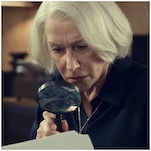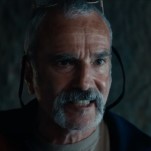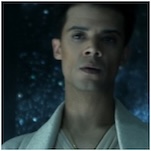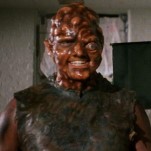True Detective: “After You’ve Gone” (Episode 1.07)

“It never sat right with me then, and it doesn’t now, you asking me to lie to you about him.”
-Cohle
In an episode where Rust and Marty make amends and reunite a decade after their bloody split to settle a final debt and hunt the Yellow King in earnest, it’s funny that this line stuck with me above all else. It comes near the end of the episode, in a brief and otherwise forgettable scene when Maggie visits Rust in his run-down bar. She asks him to assure her that whatever he and Marty are working on won’t end with her ex-husband getting hurt. He tells her he can’t make that promise, and then delivers his strange rebuke. It seems to come from left field, and the formulation itself is odd. Maggie used to ask him whether Hart was sleeping around, sure, but what does he mean when he says that she asked him to lie?
When that word comes into play, “lie,” it immediately makes you think of the lies Rust told on Marty’s behalf; he knew his partner was cheating, but he kept quiet. So he fibbed for Marty, maybe, but that’s not what he’s saying here, and the meaning isn’t clarified. In fact, it takes a moment to parse, but when you do, it’s an incisive bit of dialogue. What he actually means is that when Maggie asked him whether her husband was faithful, she wasn’t after the truth. The truth was always obvious. What she wanted was a comfortable lie—she wanted Rust to reassure her, because, as I discussed at length in last week’s review, she lacked the courage to leave and needed the solace of deception to maintain her own personal status quo. (Finally, that staus quo became untenable in the face of Marty’s bald infidelity, and even then it took a destructive act for Maggie to break free.) When she asked Rust for the truth, there was an implicit bargain that both understood.
The next mystery about the line, then, is why it came into Rust’s mind at that moment. Had he been stewing on it for the past decade? Probably. But there’s something more, and to understand that, we need to understand the present. Again, Maggie is asking him for something. She wants an assurance that Hart will be safe. And again, she’s smart enough to know better. Everything she needed to know was conveyed in Hart’s visit, when he thanked her in a way that doubled as goodbye. She understands Cohle’s obsessive streak, and even if she doesn’t know the specifics, she’s smart enough to see the danger facing them both. But her inability to face the truth hasn’t waned with the years, and she’s asking Cohle to lie to her again. She needs the deception that will give her comfort. She hasn’t changed, but Cohle has; he won’t whitewash the truth the way he did with Marty’s infidelity years ago.
-

-

-

-

-

-

-

-

-

-

-

-

-

-

-

-

-

-

-

-

-

-

-

-

-

-

-

-

-

-

-

-

-

-

-

-

-

-

-

-








































